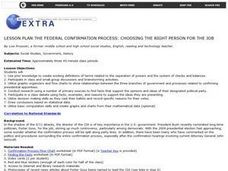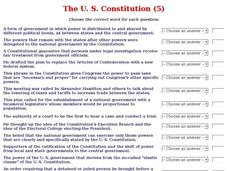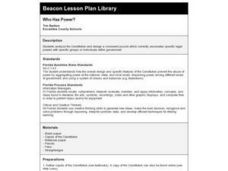Curated OER
The Embodied Presidency
Tenth graders analyze Roosevelt's Fireside Chats. In this Franklin D. Roosevelt presidency, 10th graders determine how well FDR's government programs aided victims of the Great Depression. Students examine selected Fireside Chats and...
Curated OER
THE FEDERAL CONFIRMATION PROCESS: CHOOSING THE RIGHT PERSON FOR THE JOB
Students analyze the process whereby presidential appointees are confirmed.
Curated OER
The Right to Remain Resilient
Students examine the Civil Rights Movements in the U.S., both current and historic. In small groups students investigate a specific civil rights group, create an illustrated timeline, noting key events, people, and state and federal laws.
Curated OER
You and the Judicial System
High schoolers explore how the structure of the state and federal judicial systems affect them. They select an appropriate media and create a presentation on the structure of the judicial system, the criminal judicial system and a guide...
Curated OER
The Supreme Court: The Judicial Power of the United States
Students investigate some basic facts about the Supreme Court by examining the United States Constitution and one of the landmark cases decided by that court. The operation of the Supreme Court forms the focus of the lesson.
PBS
The Roosevelts: An Intimate History—Snapshot Lessons
The Roosevelt family was one of the most influential and prominent political forces in the 20th century, leaving behind a wide-ranging legacy of conservation, progressivism, and economic growth. Learn more about President Theodore...
Heritage Foundation
Lawmaking and the Rule of the Law
How many constitutional clauses does it take to create a bill? High schoolers find out with several activities and selected clauses about the rule of law and the US Constitution. Various coinciding activities help to strengthen learning.
Curated OER
The U. S. Constitution (5)
In this online interactive American history worksheet, students answer 17 fill in the blank questions regarding the U. S. Constitution. Students may submit their answers to be scored.
Curated OER
It's All About Justice
Students examine a specific environmental concern to their local community. In groups, they explore how the justice system would deal with the problem by participating in a treasure hunt. They review the meaning of federal and state...
Curated OER
Are We the People?
Students investigate their elected officials and their roles. For this governmental leadership lesson, students discuss the Constitution and research their elected officials. They also organize the information they find regarding the...
Judicial Learning Center
The Players in the Courtroom
Courtrooms are complicated. In addition to the many rules, there are a number of people whose jobs are not very clear to the casual courtroom observer. With the resource, individuals identify some of these roles and review more...
Judicial Learning Center
Types of Court Cases
How can one court acquit someone of a crime, while another convicts the person of the same one? It's all because of the differences between civil and criminal trials. An informative resource provides scholars in the field of criminology...
Curated OER
Landmark Supreme Court Cases And The Constitution
Have an engaging class discussion on the Bill of Rights, U.S. Constitution, and the Supreme Court. Learners examine multiple aspects of the Marbury v. Madison case and the impact that case had on the judicial system in the U.S. Web...
National Endowment for the Humanities
George Washington: The Precedent President
Everyone knows that George Washington was the first president, but do your scholars know why that was so important? The lesson plan, the third in a sequence of three, allows learners to understand how George Washington set a precedent...
Judicial Learning Center
Law and the Rule of Law
We hear a lot about the importance of the rule of law, but most people do not really know what those words mean. The lesson is a webpage that defines the rule of law, explains why it is important in a democratic society and provides...
Curated OER
The Supreme Court: The Judicial Power of the United States
Students learn basic facts about the Supreme Court by examining the United States Constitution and one of the landmark cases decided by that court.
Curated OER
Who Has Power?
Fourth graders discuss abuse of power in government and examine the Constitution for specific powers in each branch. They create a crossword puzzle utilizing terms and information regarding division of government powers and federalism
Curated OER
Checks and Balances: Japanese-American Incarceration
Middle schoolers examine the three branches of the Federal Government and their decision to place Japanese-Americans in camps during World War II. They analyze debates made by leaders during this time period.
Curated OER
Graphically Speaking
Students discover the links between population and Congressional representation. In this government lesson, students research population statistics and create spreadsheets that compare population to the number of Congress members per state.
Curated OER
Inner Workings of Cabinet
Ninth graders explain the relationship of the Cabinet within the Canadian Government structure through video, worksheets and spreadsheets.
Curated OER
Mueller v. Allen
Students investigate a First Amendment legal case involving religion, education, and reimbursement of tuition payments. They research the background of the cases and its precedents.
Curated OER
Who Gets the Job?
Students explore the process for presedential Cabinet appointments. They determine common characteristics found in members of the Cabinet.
C-SPAN
Supreme Court Justices Research and Resumes
According to Article III, Section1 of the United States constitution, the only qualification one needs to be appointed to the Supreme Court is to demonstrate "good behavior." The president and Congress are given the power to determine...
Administrative Office of the US Courts
Nomination Process
"I do solemnly swear that I will support and defend the Constitution of the United States..." Scholars investigate the nomination process of Supreme Court justices when assuming office. Through examination of primary and secondary...

























